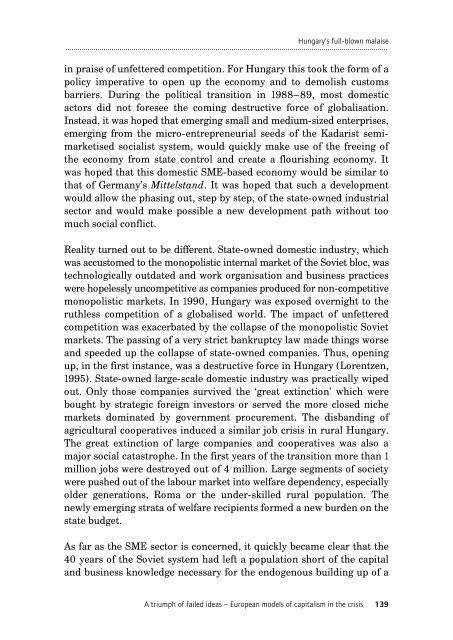A triumph of failed ideas European models of capitalism in ... - Journal
A triumph of failed ideas European models of capitalism in ... - Journal
A triumph of failed ideas European models of capitalism in ... - Journal
You also want an ePaper? Increase the reach of your titles
YUMPU automatically turns print PDFs into web optimized ePapers that Google loves.
Hungary’s full-blown malaise.................................................................................................................................................................<strong>in</strong> praise <strong>of</strong> unfettered competition. For Hungary this took the form <strong>of</strong> apolicy imperative to open up the economy and to demolish customsbarriers. Dur<strong>in</strong>g the political transition <strong>in</strong> 1988–89, most domesticactors did not foresee the com<strong>in</strong>g destructive force <strong>of</strong> globalisation.Instead, it was hoped that emerg<strong>in</strong>g small and medium-sized enterprises,emerg<strong>in</strong>g from the micro-entrepreneurial seeds <strong>of</strong> the Kadarist semimarketisedsocialist system, would quickly make use <strong>of</strong> the free<strong>in</strong>g <strong>of</strong>the economy from state control and create a flourish<strong>in</strong>g economy. Itwas hoped that this domestic SME-based economy would be similar tothat <strong>of</strong> Germany’s Mittelstand. It was hoped that such a developmentwould allow the phas<strong>in</strong>g out, step by step, <strong>of</strong> the state-owned <strong>in</strong>dustrialsector and would make possible a new development path without toomuch social conflict.Reality turned out to be different. State-owned domestic <strong>in</strong>dustry, whichwas accustomed to the monopolistic <strong>in</strong>ternal market <strong>of</strong> the Soviet bloc, wastechnologically outdated and work organisation and bus<strong>in</strong>ess practiceswere hopelessly uncompetitive as companies produced for non-competitivemonopolistic markets. In 1990, Hungary was exposed overnight to theruthless competition <strong>of</strong> a globalised world. The impact <strong>of</strong> unfetteredcompetition was exacerbated by the collapse <strong>of</strong> the monopolistic Sovietmarkets. The pass<strong>in</strong>g <strong>of</strong> a very strict bankruptcy law made th<strong>in</strong>gs worseand speeded up the collapse <strong>of</strong> state-owned companies. Thus, open<strong>in</strong>gup, <strong>in</strong> the first <strong>in</strong>stance, was a destructive force <strong>in</strong> Hungary (Lorentzen,1995). State-owned large-scale domestic <strong>in</strong>dustry was practically wipedout. Only those companies survived the ‘great ext<strong>in</strong>ction’ which werebought by strategic foreign <strong>in</strong>vestors or served the more closed nichemarkets dom<strong>in</strong>ated by government procurement. The disband<strong>in</strong>g <strong>of</strong>agricultural cooperatives <strong>in</strong>duced a similar job crisis <strong>in</strong> rural Hungary.The great ext<strong>in</strong>ction <strong>of</strong> large companies and cooperatives was also amajor social catastrophe. In the first years <strong>of</strong> the transition more than 1million jobs were destroyed out <strong>of</strong> 4 million. Large segments <strong>of</strong> societywere pushed out <strong>of</strong> the labour market <strong>in</strong>to welfare dependency, especiallyolder generations, Roma or the under-skilled rural population. Thenewly emerg<strong>in</strong>g strata <strong>of</strong> welfare recipients formed a new burden on thestate budget.As far as the SME sector is concerned, it quickly became clear that the40 years <strong>of</strong> the Soviet system had left a population short <strong>of</strong> the capitaland bus<strong>in</strong>ess knowledge necessary for the endogenous build<strong>in</strong>g up <strong>of</strong> aA <strong>triumph</strong> <strong>of</strong> <strong>failed</strong> <strong>ideas</strong> – <strong>European</strong> <strong>models</strong> <strong>of</strong> <strong>capitalism</strong> <strong>in</strong> the crisis 139








